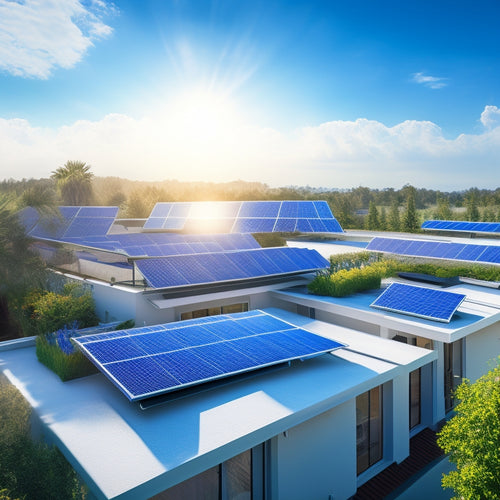
Solar Panel Battery Storage Systems for Efficient Homes
Share
You're looking to optimize your home's energy efficiency with a solar panel battery storage system. By investing in this technology, you'll reduce your reliance on the grid, lower your energy bills, and even generate revenue by selling excess energy back. Your system will work by converting sunlight into electricity, storing excess energy in a battery, and discharging it when needed. To get the most out of your investment, you'll need to choose the right battery chemistry and capacity for your daily energy needs. With proper installation, maintenance, and monitoring, you'll be well on your way to energy independence - and there's even more to investigate about how to maximize your system's potential.
Key Takeaways
- Solar panel battery storage systems enhance energy independence and reduce reliance on the grid, lowering energy bills and carbon emissions.
- Choosing the right battery system involves selecting the suitable chemistry, capacity, and reliability to match daily energy requirements and optimize performance.
- Proper installation and maintenance by certified professionals are crucial to ensure safety, compliance, and optimal performance of the system.
- Advanced features like smart inverters and monitoring systems can optimize energy production efficiency and enable selling excess energy back to the grid.
- With decreasing energy storage costs, solar panel battery storage systems become a more viable option for efficient homes seeking to reduce their carbon footprint.
Benefits of Solar Battery Storage
Having a solar panel battery storage system installed in your home or business can change your viewpoint on energy production and consumption.
You'll no longer be a passive energy consumer, but an active energy producer, with the power to generate and store your own electricity.
One of the most significant benefits of solar battery storage is the cost savings it provides. By storing excess energy generated during the day for use at night or during power outages, you can reduce your reliance on the grid and lower your energy bills.
Additionally, you can even sell excess energy back to the grid and earn revenue.
Solar battery storage also provides energy independence, allowing you to power your home or business even when the grid is down.
This means you can continue to operate critical systems, such as refrigeration, lighting, and communication, even in the event of a power outage.
With solar battery storage, you're in control of your energy production and consumption, making you more self-sufficient and resilient.
How Solar Panels and Batteries Work
With solar panels installed on your rooftop, you're utilizing the sun's energy to generate electricity, but how does it all work? Understanding the process is essential to leveraging the full potential of solar energy.
Here's a breakdown of how solar panels and batteries work together:
-
Solar Energy Generation: Solar panels convert sunlight into direct current (DC) electricity.
-
Inverter Conversion: An inverter converts the DC electricity into alternating current (AC) electricity, making it usable for your home.
-
Excess Energy Storage: When your solar panels produce more electricity than you're using, the excess energy is stored in a battery via a charge controller.
- Battery Discharge: When you need electricity and your solar panels aren't generating enough, the battery discharges stored energy to power your home.
Choosing the Right Battery System
You've got a solar panel system up and running, but you're not quite done yet - you need a reliable battery storage system to maximize your energy independence.
Choosing the right battery system is essential to guarantee you get the most out of your solar panel investment.
When selecting a battery system, contemplate the battery chemistry. Lithium-ion batteries are a popular choice for solar panel systems due to their high energy density and long lifespan.
Lead-acid batteries, on the other hand, are more budget-friendly but have a lower energy density and shorter lifespan.
Another key factor to take into account is system capacity. You'll need to determine how much energy you need to store to meet your daily energy requirements.
A larger system capacity means you'll have more energy stored for later use, but it also increases the upfront cost.
Reflect on your energy usage patterns and size your battery system accordingly.
Installation and Maintenance Tips
Properly installing and maintaining your solar panel battery storage system is vital to guarantee peak performance, longevity, and safety.
You've chosen the right battery system, now it's time to verify it's installed and maintained correctly.
During the installation process, it's essential to follow the manufacturer's guidelines and local building codes.
Here are some key tips to keep in mind:
-
Hire a certified professional: Confirm your installer has the necessary experience and certifications to handle the installation process.
-
Choose the right location: Place your battery storage system in a well-ventilated area, away from flammable materials and potential water damage.
-
Monitor your system regularly: Keep an eye on your system's performance and address any issues promptly to prevent damage or safety hazards.
- Perform regular battery maintenance: Check your battery's state of charge, voltage, and temperature regularly to guarantee peak performance and extend its lifespan.
Future of Solar Energy Storage
As the world shifts towards a more sustainable future, the demand for efficient solar energy storage solutions is skyrocketing. You're likely to see emerging technologies reshaping the industry in the next decade.
Advancements in battery storage systems will enable you to store excess energy generated by your solar panels during the day, allowing you to power your home at night or during grid outages.
Grid integration will become more seamless, enabling you to sell excess energy back to the grid and offset your energy bills. Smart inverters and advanced monitoring systems will optimize energy production and consumption, ensuring maximum efficiency.
As energy storage costs continue to decline, you'll be able to store more energy and rely less on the grid. This will lead to increased energy independence and reduced carbon emissions.
With the future of solar energy storage looking brighter than ever, you can expect to see widespread adoption of these technologies in the coming years.
Frequently Asked Questions
Can I Use a Solar Battery Storage System With My Existing Solar Panels?
You can definitely integrate a solar battery storage system with your existing solar panels, achieving seamless solar panel integration and increased energy independence, as long as your current setup meets the necessary compatibility and technical requirements.
Are Solar Battery Storage Systems Compatible With Grid-Tie Inverters?
You're wondering if your grid-tie inverter will play nicely with a solar battery storage system. Fortunately, most modern grid-tie inverters are compatible, especially those with built-in storage capabilities or specific storage modes.
Can I Charge My Electric Vehicle With a Solar Battery Storage System?
You can charge your electric vehicle with a solar battery storage system, leveraging charging benefits like reduced strain on the grid and lower costs. Verify your system's battery capacity can handle the added load, typically 7-10 kWh.
Do Solar Battery Storage Systems Require Special Permits or Licenses?
When installing a battery storage system, you'll need to comply with local regulations, obtaining necessary permits and licenses, ensuring your setup meets installation requirements and regulatory compliance, avoiding costly rework and potential safety hazards.
Are Solar Battery Storage Systems Covered by Homeowner's Insurance?
You'll be relieved to know that your homeowner's insurance typically covers solar battery storage systems, but you'll need to review your policy's coverage limits and verify your insurance provider offers specific coverage for renewable energy systems.
Related Posts
-

Waterproofing Solar Panels for Vehicles: A Step-by-Step Guide
When waterproofing solar panels for your vehicle, start by evaluating your energy requirements and selecting the righ...
-

What Makes a Road Bike-Friendly by Design?
As you plan and design roads, incorporating features like dedicated bike lanes, smooth surfaces, and traffic calming ...
-

Best Solar Panel Options for Maximum Energy Savings
You can maximize your energy savings with solar panels that boast efficiency ratings above 20%, paired with extensive...


